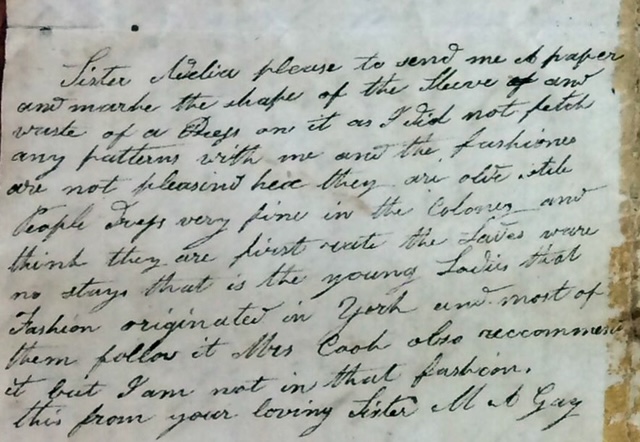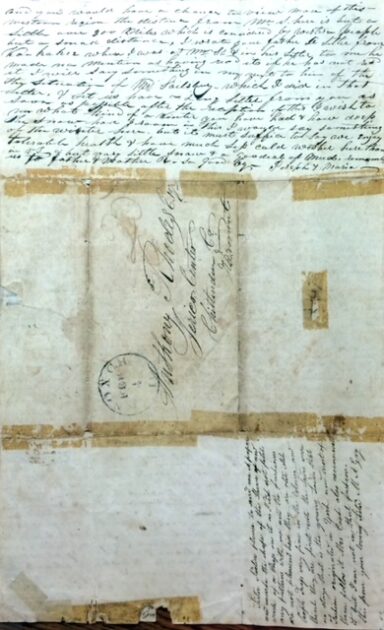Out of the Attic: My “Who Do You Think You Are” moment

by Kristin Gay White Moore
I’m sure you’re familiar with the television show, “Who Do You Think You Are,” where celebrities work with genealogists to research their family history. In each show, there’s always a “wow” moment for some special discovery or document. Well, my husband calls the letter I’m going to describe as my WDYTYA moment.
One of my paternal great-great-grandfathers, Lusher Gay, moved his family from Addison County, Vermont, to Knox County, Illinois in late 1836. In his autobiography (an artifact for another column), his son (my great-grandfather) describes him as having “a longing to see the great West.” The autobiography doesn’t provide any additional insights into the living conditions once they arrived, so aside from some social histories of the time, I really had no idea of the challenges they confronted. All I knew was that they settled in or near Galesburg, Knox County, Illinois, and that shortly after that Knox College was established.
My husband and I traveled to Springfield, Illinois, in 2016 for the FGS Conference. While we were in the area, I reached out to the archivist at Knox College to see if they might have any materials relating to either Lusher Gay, my 2ggf, or William H. Gay, my ggf. The archivist called and told me that, although she hadn’t found anything specifically on William, she thought we should come and see a letter that they did have in their possession as it did mention my 2ggf. And wow! That was my WDYTYA moment!

The letter is four pages long – two sheets, written on both sides and folded to make an envelope. It was postmarked at the Knox Court House on February 4, 1838. Rather than a paper stamp, “25” is written in the upper right. The letter is from Joseph and Maria (Rhodes) Gay (my 2nd great-granduncle/aunt) in Galesburg to Maria’s brother, Anthony Rhodes, in Chittenden County, Vermont. Inside, it’s addressed “Dear Brother and Sister.”
The archivist did not know how the letter ended up in their archives, but we do know that Anthony Rhodes and his family subsequently moved to Knox County as did a sister, Abigail Adelia (Rhodes) Fuller (mentioned in the letter) and her husband, Francis Fuller.
Most of the letter was written by Maria describing the condition of the goods they had shipped, as well as the area and structure in which they lived.
We commenced Housekeeping the 6th of Jany in the woods. Out of sight of any house yet not far from Neighbors nearby 1 mile from Lusher [my 2ggf], we live in the worst looking pile of logs you ever saw…. It is about 16 by 14 ft and A Chimmney made of sticks which dus not reach to the roof by several foot
She goes on to say,
you will wonder why we do not have our stove but I will till you our room is so filled we have no where to set it when our table is set we cannot stur around atall we are cramed in thick as we can be yet we set and laugh and wonder what our eastern Friends would think if they were to pop in and see us
There is some advice from both Maria and Joseph in the letter to the readers if they are considering moving west, discussing the weather, the neighbors, and the costs of lumber and labor. There’s also a small postscript from their 10-year-old daughter, Loraine Eliza, describing how she’s been making “shuger.”
Maria is not totally content with western customs, as you can see from this postscript to her sister-in-law Adelia.

Sister Adelia please to send me A paper and marke the shape of the sleeve and waste of a Dreſs on it as I did not fetch any patterns with me and the fashiones are not pleasint here they are olde stile people dreſs very fine in the Colony and think they are first rate the Lades ware no stays that is the young Ladies that Fashion orginated in York and most of them follow it Mrs. Cook also recommend it but I am not in that fashion. this from your loving Sister M A Gay
I am so thrilled to have photographs of this letter. It brings the struggles of that time alive, and I’m so impressed with the strength and will of our ancestors to endure the challenges of what was then the frontier.

